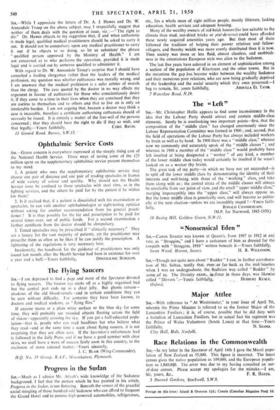Ophthalmic Service Costs
Sta.—Grave concern is everywhere expressed at the steeply rising cost of the National Health Service. Three ways of saving some of the £25 million spent on the supplementary ophthalmic service present themselves to my mind.
1. A patient who uses the supplementary ophthalmic service may choose one pair of distance and one pair of reading spectacles in frames of wide variety of colour and quality. Why should not the Health Service issue be confined to those spectacles with steel rims, as in the fighting services, and the others be paid for by the patient if he wishes for them?
2, Is it realised that, if a patient is dissatisfied with his examination or spectacles, he can visit another ophthalmologist or sight-testing optician without asking for another recommendation from his general practi- tioner ? It is thus possible for the fee and prescription to be paid for several times over, out of public funds. For a second examination a further certificate from the doctor should be compulsory.
3. Tinted spectacles may be prescribed if " clinically necessary." They are a luxury for the vast majority of patients, yet the practitioner may prescribe them as often as he likes if he can justify the prescription. A tightening of the regulations is very necessary here.
Incidentally, the handbook for the guidance of practitioners was only issued last month, after the Health Service-had been in existence for over






































 Previous page
Previous page